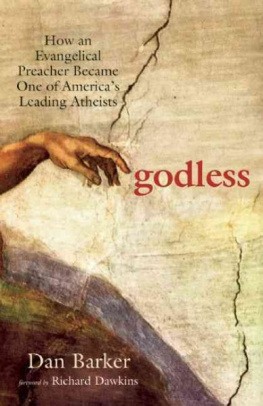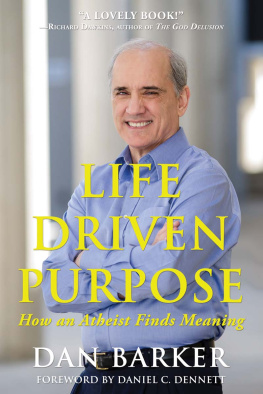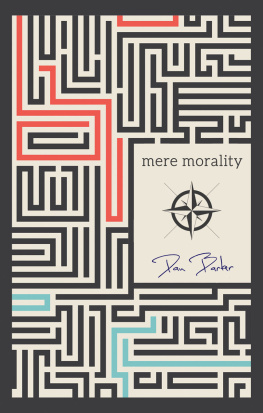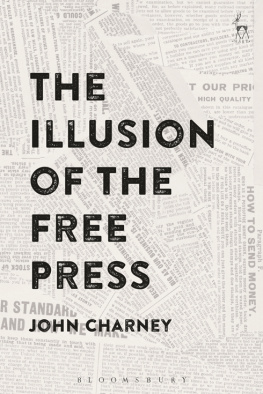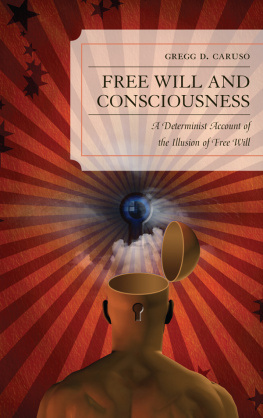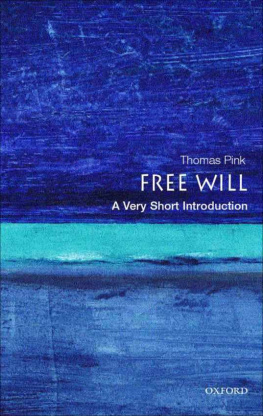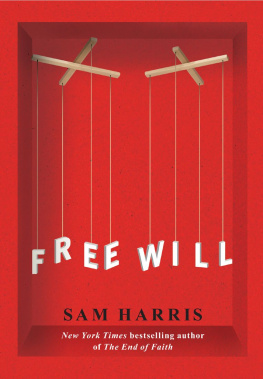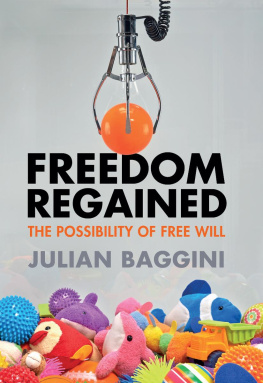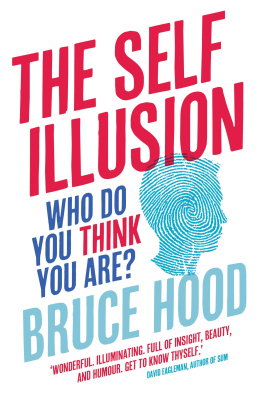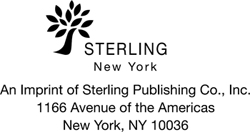STERLING and the distinctive Sterling logo are registered trademarks of Sterling Publishing Co., Inc.
Interior text 2018 Daniel Barker
Cover 2018 Sterling Publishing Co., Inc.
All rights reserved. No part of this publication may be reproduced, stored in a retrieval system, or transmitted in any form or by any means (including electronic, mechanical, photocopying, recording, or otherwise) without prior written permission from the publisher.
ISBN 978-1-4549-2736-5
For information about custom editions, special sales, and premium and corporate purchases, please contact Sterling Special Sales at 800-805-5489 or .
sterlingpublishing.com
Cover design by Igor Satanovsky
Interior design by Gavin Motnyk
The Fell Types are digitally reproduced by Igino Marini. www.iginomarini.com
Cover art: Ihnatovich Maryia/Shutterstock.com
Acknowledgments photo by Dan Barker
Warmly dedicated to Tom and Darrell, who share parents and memories (if not always the same views) with me.
CONTENTS
FOREWORD
In 1985, the physiologist Benjamin Libet conducted a series of experiments that involved taking EEG readings of subjects brains engaged in a task that required them to press a button at random intervals whenever they felt like it during the session. Results: several seconds before the decision was consciously made by the subject, the brains motor cortex was activated.
In these studies, and others, scientists measuring subjects brains know which decision subjects would make before the subjects themselves know it! That is spooky, and if these results dont bother you then youre not thinking hard enough about them. What they imply is that we are not free to choose in the way we think we are. We feel free, but thats just what our conscious selves believe because they dont know about the inputs feeding into them from below that have already made the choice. As the neuroscientist Sam Harris articulated it in his widely-read book Free Will, Our wills are simply not of our own making. Thoughts and intentions emerge from background causes of which we are unaware and over which
The principle of determinism holds that every event in the universe has a prior cause. If all effects have causes, including human thoughts and actions, then where in the causal chain does the act of choice enter? Even if there were a Mini-Me up there calling the shots, his little brain would have to be just as determined as my big brain, so for Mini-Me to have free will he would have to have a mini Mini-Me inside of him pulling his strings, and mini Mini-Me would himself need an itty-bitty mini Mini-Me inside of his brain... ad infinitum. And if you believe in souls, this fails in the same way as Mini-Me does. A soul inside of you pulling your strings does not grant you freedom; it just means the soul is in control. And having a soul would mean that theres a mini-soul inside the soul directing its actions, and so forth. It would seem that if determinism is true then we do not have free will. And yet... we feel free. We feel like we make choices.
Herein lies the problem, which helps explain the results of a 2009 survey of 3,226 philosophy professors and grad students asked to weigh in on thirty different subjects of concern in their field, from a priori knowledge, aesthetic value, and God to knowledge, mind, and moral realism. On the topic of free will: compatibilism, libertarianism, or no free will, the survey found the following results:
| Accept or lean toward: | Compatibilism | 59.1% |
| Other | 14.9% |
| Accept or lean toward: | Libertarianism | 13.7% |
| Accept or lean toward: | No free will | 12.2% |
By far, the majority of professional philosophers hold the position that free will and determinism are compatible.
Now, from a scientific perspective, it shouldnt matter how many people support one or the other position. Only the quality of the evidence and arguments should matter. As Einstein said in response to a 1931 book skeptical of the relativity theory titled A Hundred Authors Against Einstein, Why one hundred? If I were wrong, one would have been enough. But there is something revealing about these figures, and that is this: if the most qualified people to assess a problem are not in agreement on an answerand the free-will/determinism problem has been around for thousands of yearsit may be that it is an insoluble one. For example, is it really reasonable for the 12.2 percent of philosophers who are determinists to conclude that 59.1 percent of their professional colleagues are simply wrong in taking the compatibilist position? Isnt it more likely that the issue comes down to language and what is meant by the terms free will and determinism?
This is what I strongly suspect, and in my book The Moral Arc I worked out how accepting a determined universe does not preclude retaining free will and moral responsibility through four compatibilist workarounds: (1) modular mindeven though a brain consists of many neural networks in which one network may make a choice that another network finds about later, they are all still operating in a single brain; (2) free wontvetoing competing impulses and choosing one thought or action over another; (3) choice as part of the causal netwherein our volitional acts are part of the determined universe but are still our choices; (4) degrees of moral freedoma range of choice options varying by degrees of complexity and the number of intervening variables.
Dan Barkers poignantly argued and beautifully presented case for harmonic freedom and social free will gels beautifully with my own and others cases for how we can be free in a determined universe. Barker is one of our finest minds and most effective activists for atheism, and as a former preacher and theist, he knows the necessity of making the case for moral freedom as well if we are to rebut the calumny that atheists have no morality because we dont believe in moral responsibility (if were not free then we cant be held responsible for our actions). Barkers harmonic free will, so succinctly presented in this tightly reasoned book, does not deny the scientific reality of determinism; but it does engage us as humans in the social process of being responsible for our choices while interacting with other humans. In so doing, Barker has essentially eliminated the problem of free will and determinism. There is really nothing to resolve.
I had an occasion to elaborate on this problem during a 2016 episode of Dave Rubins talk show, in which he asked me my opinion of Sam Harriss seemingly airtight case for determinism. I suggested the following thought experiment. Suppose a hard determinist were to have a one-night stand while on the road and his wife found out. How does he account for his actions? Does he, pace the explanation for generic human behavior in Sams book, say something like this to his wife?


